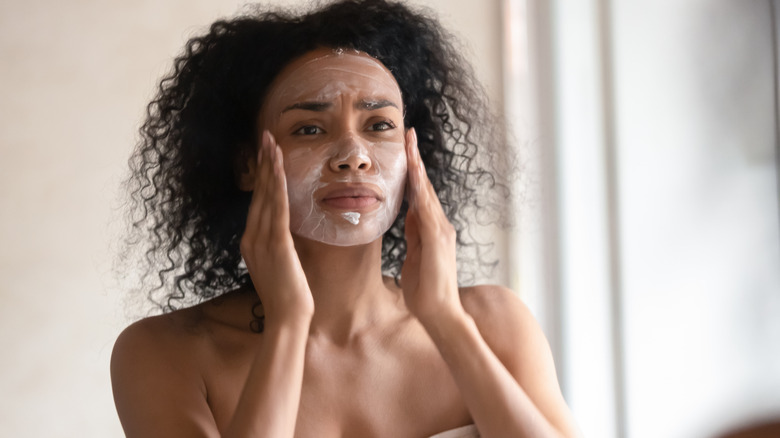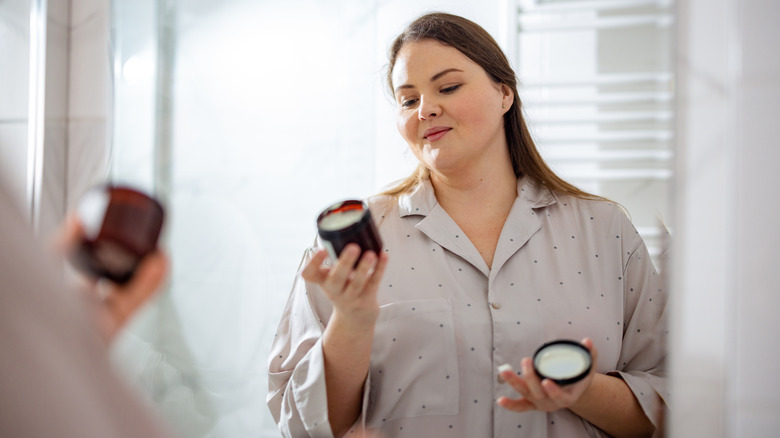How To Prevent Allergic Reactions To Your Skincare Products
Most people have some sort of skincare routine, but not everybody stops to think about what they are putting on their faces on a daily basis. Unless you know that you have a severe allergy to certain ingredients, you're most likely not looking at the product labels all that much.
Allergic reactions can, however, differ in severity — meaning, you don't necessarily need to have a huge flare-up for it to be considered an allergy. If you've noticed your skin reacting in even the slightest way to certain skincare products, you're probably having some sort of an allergic reaction.
Not only that, but you can develop allergies throughout your life, which means you might react to a product that has been safe to use thus far. While there are many, many skincare trends out there, and it's tempting to jump right into them, it's important to understand how the ingredients that are being used can affect your skin. After all, it's better to be safe than sorry.
You can develop an allergy to skincare ingredients over time
According to allergist Sandra Hong, M.D., it is not uncommon to suddenly react to a product you thought was safe to use. "The first time you come into contact with a product, it can take a bit of time for [a reaction] to happen," she explained in a conversation with the Cleveland Clinic, adding that the more you use the allergen, the quicker the allergic reaction is going to be in the future.
The most common allergic reaction is contact dermatitis, which is characterized by irritated skin and is the result of your skin coming into contact with an allergen, as per Healthline. The affected area can get itchy, red, and even swollen, and one of the most common allergens out there are skincare chemicals.
Most of the common allergens can be found in basic skincare products, such as serums, moisturizers, and peels, so it's crucial to read labels and get familiar with what's going on your face. These include acids, emollients, essential oils, and fragrances, Everyday Health reports. Contrary to popular opinion, acids like salicylic and glycolic acids and topical retinoids can do more harm than good if you use them too much, Joshua Zeichner, M.D., explained to Everyday Health. However, despite their prevalence in skincare products, there are ways to minimize your chances of getting an allergic reaction.
Know your allergy triggers and find alternatives
While it's not possible to be completely sure you won't react to a new skincare ingredient, you can still take some precautionary steps. Always patch-test a new product, even if you think it's safe to use. If you haven't used that specific combination of ingredients, it shouldn't go on your face first. Make sure to do your research, get to know your skin triggers, and drop those bad skincare habits for better skin. In the event that you're already having a reaction, Sandra Hong, M.D., advises asking yourself what has changed in your skincare routine that might have caused it. To soothe the symptoms, Hong says to turn to an OTC remedy first — such as an oral antihistamine or medicinal lotion — and to visit your doctor if the symptoms don't subside or get worse, as she shared with the Cleveland Clinic.
Other than avoiding the products you know irritate your skin, obviously, focus on finding alternatives that work just as well but aren't allergens in your case. For example, if you're sensitive to certain acids or retinoids, board-certified dermatologist Azadeh Shirazi, M.D., recommends swapping them out for niacinamide, a common skincare ingredient that works similarly, she shared with Vogue.
Those sensitive to fragrance in skincare products should look for fragrance-free alternatives, and if you're acne-prone, focus on finding products that are labeled "non-comedogenic," which means the ingredients won't clog your pores. Also, sometimes natural skincare ingredients work just as well as their artificial counterparts, so don't overlook them.


